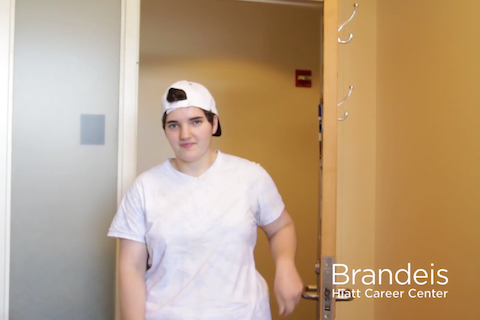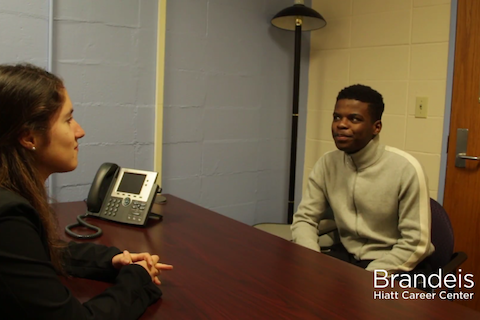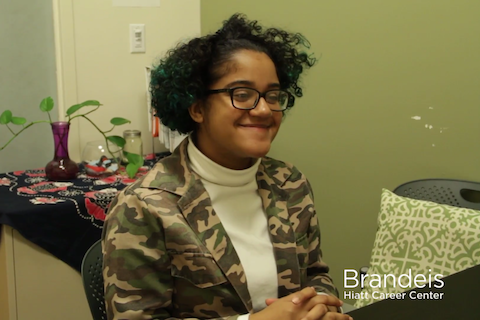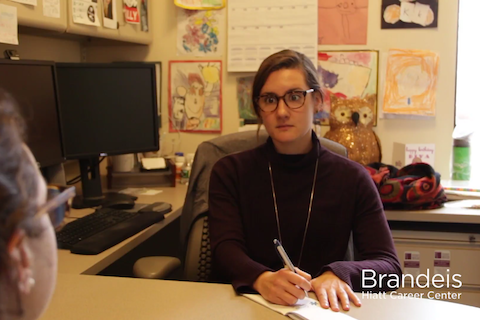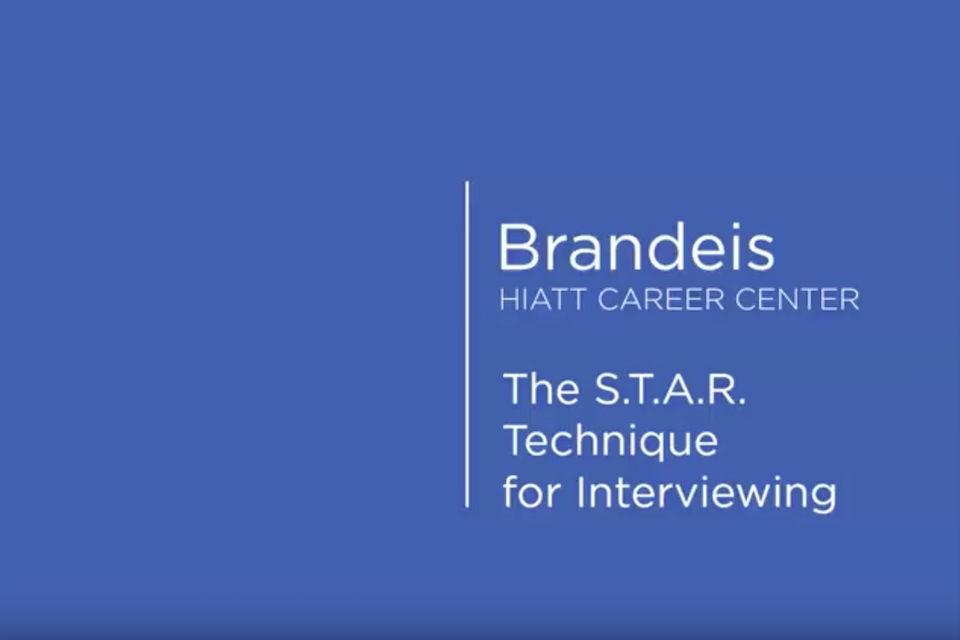Interviews
Interviews are a two-way street. Not only do they provide the opportunity for you to present your background and experiences but give you the ability to evaluate a potential supervisor and work environment. There are various formats depending on the type of interview and its purpose. You may be participating in an informational interview with one of your contacts or in the final stages with an employer. No matter what the scenario is, it is important to be prepared and polished.
Preparing for the Interview
You wouldn't show up for your final exam without studying what you'll be tested on, correct? The same applies in interviewing as an unprepared interviewee can ruin their chances of landing a position. To help you put your best foot forward we offer the following advice:
- Review the job description and research the organization in detail to understand what they are looking for.
- Reflect on what you bring to the position, reviewing your application materials and why you want this position.
- Know the interview logistics, plan ahead for commute time and interview attire
- Practice telling relevant stories and prepare your own questions.
- Reflect on your experiences and come up with a few stories based on key skills/qualifications that are outlined in the job description.
- Dress for the job you want!
Expand All
Interviews take different formats depending on type of interview and its purpose.
Phone
Phone interviews are often brief screenings interviews focused on basic qualifications and interest in the position. Find a quiet place to make your call. Prepare your space with relevant application materials to reference during the conversation. It's important to show enthusiasm for the position, smile even on the phone, because it comes through in your voice.
In Person
In-person interviews may last from a half hour to a full day to help employers get a sense of your personality and style, as well as to be able to ask you about your qualifications, skills and interests. In-person interviews could be with one person, multiple people in a group or several interviews back to back. Find out who you will be interviewing with so you can best prepare, by asking the contact for information about the interview format and names of your interviewers. This can be done when you are communicating with your contact.
Practice your answers and be aware of your non-verbal cues, including eye contact and body language. Your interview starts as soon as you enter the building, so forget about staff in reception or at a front desk. Greet your interviewer with confidence, making eye contact and extending your hand for a firm handshake. Always accept a drink like water of coffee if offered, even if you don’t plan on drinking it. It's considered polite.
Skype or video-conferencing
interviews are common and often used to screen applicants. Be sure to test out the technology in advance. Pick a neutral background with a quality Internet connection. Treat the interview as if it was an in person interview, including dressing professionally and maintain eye contact with the camera.
Group Interviews
Employers use group interviews to better gauge how you work on a team and to meet with a number of candidates at once. Groups are often asked to tackle a problem, rank priorities or discuss an issue. In addition to the answers you give the interviewer, also pay attention to how you treat the other candidates in the room.
Presentations
For positions that requires strong speaking and teaching skills, an employer might ask you to do a sample presentation during your interview. Practice your presentation to make sure that you are able to share what is most important in the time allotted.
Interview Don'ts: Tips and Situations to Avoid
Navigating the Interview
Your interview begins when you walk in the door. Be sure you are cordial and courteous to everyone you meet and interact with; first impressions are lasting ones. During the interview, you will want to provide a brief introduction about yourself, be prepared to answer questions about your skills, background and strengths, and have questions available to gain further insight and information into the role.
Asking and Responding to Questions
The most common questions include:
- Tell me about yourself.
- Why are you interested in this position?
- Why are you interested in this company?
- Walk me through your resume?
Question Types
Traditional questions that you may encounter often fall into the following categories:
- General (who you are, your interest in the position, your background)
- Behavioral (skill focused: examples of things that you have done)
- Commonly presented as "tell me about a time..." or "give me an example of..."
- Review the STAR technique below for help answering behavioral questions.
- Case (how you would approach a situation or problem)
- Case interviews are most often utilized in the consulting industry. Review the resources below on how to prepare for these specific types of questions.
Expand All
Case questions are used to evaluate your analytical ability, ability to think logically, tolerance for ambiguity, interpersonal skills and problem-solving skills. You are often given a situation or data and asked what the problems are and what you can do about them. Plan to begin early to prepare for case interviews, learn the common methods of analysis, and look for opportunities to practice.
Brandeis Resources to help you prepare:
General Guides
Mock Interviews and Practice Challenges
- Gainlo — A paid service which provides general coding and system design mock interviews and tailored feedback from interviewers at companies like Google, Facebook, Amazon, LinkedIn and Microsoft
- HackerRank — A free website for programming interview practice problems
- Impact Interview — A paid service which offers software engineering interview coaching with employees at top tech companies
- Interviewing.io — A paid (or deferred) service that allows you to book a mock interview with an engineer at a top software company
- LeetCode — A platform for coding practice and technical interview preparation, offering a vast library of coding problems and interview simulations, with both free and premium subscription options
- Pramp — A free complete tech interview practice where you can hone your interviewing skills, learn from your peers, and become comfortable performing under pressure within an interview setting
Additional Books
The STAR Technique
This technique provides a strategic framework to share concrete examples.
- S = Situation — A brief setup of the situation you are going to talk about
- T = Task — An explanation of the task you had to complete or problem you had to solve
- A = Action(s) — Specific/detailed actions you took, focusing on the skills you used in this situation
- R = Result — Positive outcome from the example you shared; how did things turn out?
Expand All
Question:
Tell me about a time you initiated a project to meet an unmet need.
Answer:
- Situation: I was a teaching assistant for a writing course, in which I was responsible for tutoring writing sections and grading.
- Task: I noticed students were over-utilizing office hours for similar types of basic questions about specific assignments, readings and group projects.
- Action(s): After sharing my thoughts with the professor, I developed a supplemental guide of frequently asked questions, tips for group assignments and examples of learning goals. I distributed this guide to both the professor and students, and together we informed students that we could speak about these types of issues further during office hours.
- Result: As a result, the professor and I experienced a decrease in student inquiries about these issues, which enabled us to focus on more in-depth conversations with students about course materials and special situations. Students also expressed an appreciation for these results and the professor now uses this guide with each section.
Questions to Ask
You will be expected to have questions at the end of the interview. Make sure that your questions:
- Relate to the position and the organization/industry
- Are appropriate to the interviewer’s level and position in the organization
- Express your research and interest for the position/organization
Sample Interview Questions
Expand All
- Tell me about yourself.
- Why should I hire you?
- What makes you unique?
- What goals have you set for yourself? How are you planning to achieve them?
- What is your most significant accomplishment?
College
- Why did you choose Brandeis?
- Why did you choose your major(s)?
- Which classes and subjects did you like the best? Least? Why?
- Have you participated in any extracurricular activities? What have you learned from participating in them?
- What do you like to do in your free time?
- Of the courses you have had at college which courses have you enjoyed the most?
Work
- What were your responsibilities as a … (research assistant, tutor, etc.)?
- Did you work independently or as part of a team?
- How did you secure the internship at…?
- What did you learn from your work at…?
- What have you learned from some of the jobs you have held?
- What kind of work environment do you prefer?
- How do you approach a work assignment when you may not "have all of the answers?"
- What work experiences have been most valuable to you and why?
- Why did you decide to seek a position with this firm/organization?
- What do you know about our firm/organization?
- What do you think is the most important current question facing our industry today?
- What criteria are you using to evaluate a particular firm/organization?
- What factors are important to you in a job?
- What are you looking for in a supervisor?
- How does this job fit into your career development?
- Why are you interested in our organization?
- What type of position are you seeking?
- What do you consider to be your major strengths and weaknesses?
- How would a friend or a professor who knows you well describe you?
- How do you handle pressure?
- How do you evaluate success?
- What has been your greatest challenge?
- Describe a situation in which you were able to use persuasion to successfully convince someone to see things your way.
- Summarize a situation where you took the initiative to get others going on an important issue, and played a leading role to achieve the results wanted.
- Describe an instance when you had to think on your feet to extricate yourself from a difficult situation.
- Tell me about a time when you worked in a group situation and things were not going well. What did you do to make the situation better and what was the result of your efforts? Would you have done anything different based on the outcome? If so, what?
- Please give a specific example of how you utilized a strength to complete a task and when you worked on improving a weakness.
Asking strong questions helps you determine if a position or organization is a good fit for you while simultaneously making you look good to an employer by highlighting your research, interest and preparation. Make sure that your questions relate to the position and the organization/industry, are appropriate to the interviewer's level and position in the organization and express your research and interest for the position/organization.
- I read that ABC was just recognized as a top orphan drug research firm by the Wall Street Journal. What are key projects underway for the upcoming year?
- While researching your company, I read that one of your challenges is xxx... How do you plan to meet this challenge?
- What are the opportunities for advancement for individuals in this position?
- When may I expect to hear from you?
- What are the next steps in the search process?
Post-Interview
Send a thank you note within 24-48 hours of your interview. This is a critical opportunity to restate your interest and qualifications that set you apart from other candidates.
Additional Tips
- Be brief. A few paragraphs at most.
- Use formal language. Avoid slang or casual phrases.
- Be customized to the interview(er). Reference something from your conversation that was particularly helpful, meaningful or interesting.
- Indicate next steps. If the person referred you to another friend or colleague, state your plan of action for contacting that person. If you plan to apply for a position after your interaction, indicate that, too.
- Be error-free. Watch out for grammar and spelling, especially people’s names and titles.
